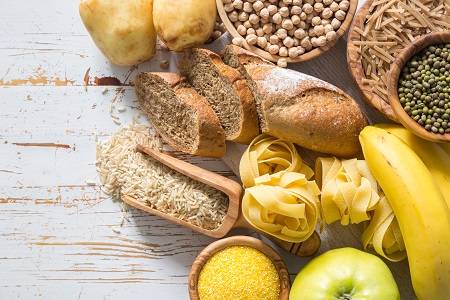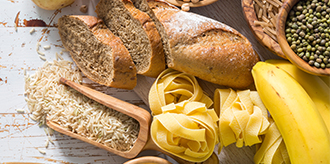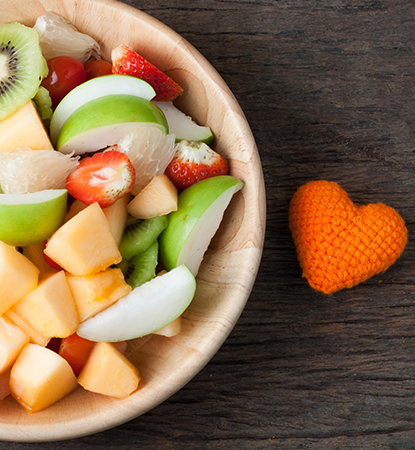
Energy & Carbohydrates
Nutrition and sport
Glucose, the body's energy concentrate
Glucose is the energy substance par excellence. It is an immediate source of energy for the muscle and the central nervous system. It mainly comes from carbohydrates in food and is stored by the liver and muscle in the form of glycogen.
Adenosine Triphosphate (ATP) is the only substrate used directly for muscle contractions. However, the ATP stock present in the organism being very low, it must be continuously re-synthesized.
The intake of sugars through energy drinks or food helps save muscle and liver glycogen reserves, a major issue for athletes during an effort of more than 90 minutes.
Low glycogen levels instantly translate into reduced performance because the intensity of muscle work cannot be maintained.
We then understand the interest of carbohydrates in the sportsman's diet :
- Before exercise, to allow you to build up your energy reserves of glycogen and therefore to delay the exhaustion period. The glycogen content of muscle is a direct function of the proportion of carbohydrates in the diet.
- During exercise, to allow you to "push your limits" by supplying the blood circulation with glucose and by slowing the exhaustion of hepatic and muscular glycogen.
- After exercise, to allow you to quickly replenish your glycogenic reserves.
What are the different types of carbohydrates ?
Today, we no longer speak of « slow » or « fast » carbohydrates but rather of carbohydrates with a low or high glycemic index.
- Carbohydrates with a high glycemic index rapidly increase the level of carbohydrates in the blood (glucose, sucrose, dextrose, maltodextrins, etc.).
- Carbohydrates with a low glycemic index provide prolonged energy over time (starch, fructose).
Which carbohydrates to favor ?
The choice of carbohydrates must be made according to the time (before, during, after the effort), the intensity of the effort and, for liquids, according to the desired osmolarity of the drink.
Complex carbohydrates with a low or medium glycemic index such as pasta, rice, potatoes consumed several days to several hours (5 days to 3 hours) before your competition, allow you to fill up on energy.

Carbohydrates with a high glycemic index such as glucose, maltose, dextrose, sucrose and maltodextrins, consumed regularly just before and during exercise, are rapidly absorbed and allow the glucose circulating in the body to be renewed.
After exercise, they also help replenish muscle energy reserves to better recover and recharge energy.
Fructose (fruit sugar) has a low glycemic index. It causes a rapid rise in blood sugar, low but constant, providing lasting energy over time. Fructose helps regulate your blood sugar and prevent the appearance of insulin spikes, which can lead to secondary hypoglycemia (feeling of weakness, hunger, dizziness, loss of concentration).

Maltodextrins, carbohydrates with a high glycemic index, have the advantage of reducing the osmolarity of drinks while maintaining their energy content, thus limiting the risks of dehydration.











Recommandé par mon médecin, je l'utilise régulièrement, avec de tvoir plus
Avis du 28/09/2024, suite à une expérience du 11/09/2024 par Silvia S